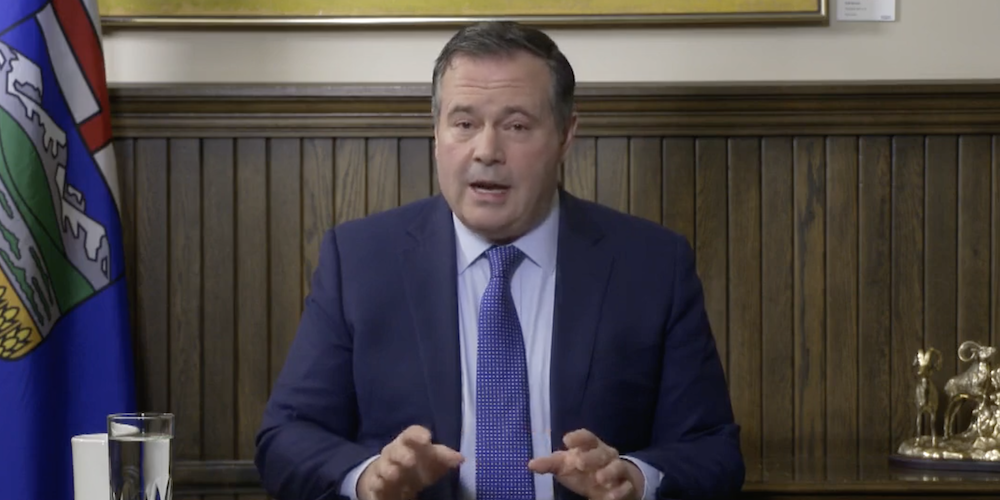Using his favourite medium—Facebook—Alberta Premier Jason Kenney announced Saturday his government plans to go to court to challenge “the unjustified use of the Emergencies Act” by Ottawa.
The one minute and 49 second video clip posted to the social media platform was not particularly informative about what the government’s legal strategy might be, or indeed if the Kenney government really has a legal strategy yet.
Kenney’s political strategy is clear enough, though—to distract from his own failure to end the two week blockade at Coutts that cost province something in the order of three-quarters of a billion dollars and keep enough of his party’s anti-vaccine-mandate rural members who supported the blockades and occupation of downtown Ottawa on side long enough to survive his April 9 leadership review.
“The federal government’s invocation of the Emergencies Act is an unnecessary and disproportionate measure that can violate civil liberties, invades provincial jurisdiction and creates a very dangerous precedent for the future,” Kenney said.
“And it’s not necessary,” he went on. “As we demonstrated here in Alberta at Coutts and Ontario did at the Windsor Ambassador Bridge, provincial law enforcement authorities are able to deal with illegal road blockades.”
On the face of it, this is an odd comment.
After all, the Kenney government appeared to sit on its duff for two weeks while the border was blocked at Coutts at a cost of close to $50 million a day to the provincial economy.
Prime Minister Justin Trudeau announced his government would invoke the Emergencies Act on Feb. 14, and it wasn’t until the same day that the RCMP began to move seriously to clear out the blockade just north of the busiest Canada-U.S. border crossing in Alberta.
In the early morning darkness a few hours before the PM’s announcement, the Mounties had raided the blockaders’ encampment and seized an arsenal of firearms, ammunition and body armour, arresting 11 people and charging four of them with conspiracy to commit murder.
So on the strength of timing alone, one could make a weak case the Alberta authorities acted first, but the premier’s conduct throughout the siege was that of a man terrified into inaction for fear of offending an extremist group with many friends in his United Conservative Party’s base.
Moreover, it has now been revealed that on Feb. 5, Kenney’s municipal affairs minister wrote the federal ministers of public safety and emergency preparedness to plead for federal help clearing the mess at Coutts.
“I am requesting federal assistance that includes the provision of equipment and personnel to move approximately 70 semi-tractor trailers and approximately 75 personal and recreational vehicles from the area,” Ric McIver told Marco Mendicino and Bill Blair.
To ask for the federal government’s help and then turn around and take it to court for helping seems both ungrateful and hypocritical.
Getting back to Kenney’s short video screed, after some folderol about how the rule of law is important, law and order must prevail, and folks have a right to protest peacefully—the term peaceful, when applied to the occupiers of downtown Ottawa, apparently, meaning white—Mr. Kenney slipped back into his comfort zone, assailing Trudeau and the Liberal federal government.
“The question then is why (is) the federal government using the power that is not necessary to seize bank accounts and assets, for example, from people arbitrarily, extra-judicially, without court orders, based on their opinions or who they’ve donated to, powers really designed to interrupt things like terrorist financing?”
His awkward rambling notwithstanding, the tendentious point Kenney wants to make is clear enough. To wit, that the situation the government faced in Ottawa and on the border wasn’t really an emergency, and that the Emergencies Act wasn’t really intended for situations like this.
A cursory read of the Emergencies Act with a note to its structure—it has separate sections on public welfare emergencies, public order emergencies, international emergencies and war—makes it clear this sort of emergency was intended to be within the ambit of the Act when it was drafted by the Conservative government of Brian Mulroney and became law in 1988.
The Act uses the wording of the Canadian Security Intelligence Service Act to define “threats to the security of Canada,” including detrimental foreign influences, activities that support the threat or use of violence for political, religious or ideological objectives, and activities that threaten to undermine or overthrow the Government of Canada.
So to most observers, the events of the past few weeks would seem to fit the bill like the proverbial glove.
Indeed, in some ways, Kenney’s own Critical Infrastructure Defence Act—which is much more clearly intended to suppress legitimate protest of the type Kenney purports to support in his Facebook video—is inspired by the Emergencies Act.
But then, the only thing that’s really consistent about Kenney is the way he puts politics over principle. Plus, of course, his willingness to use other people’s money—in this case, ours—to pursue his bad bets.
Readers will recall, of course, his unsuccessful legal challenge of the federal government’s right to impose a carbon tax, and his lost $1.3-billion bet that Donald Trump would win the 2020 U.S. Presidential election.
So now, at Kenney’s bidding, Alberta will challenge the Emergencies Act on grounds that are hinted at, but not yet quite explained in detail.
The government will also apply to be included as an intervenor in other challenges of the legislation.
This grandstanding will be done at our expense without much hope of success, but we can be thankful at least that whatever results from the premier’s efforts will likely come too late to prevent the restoration of public order and the preservation of democracy in Canada.



